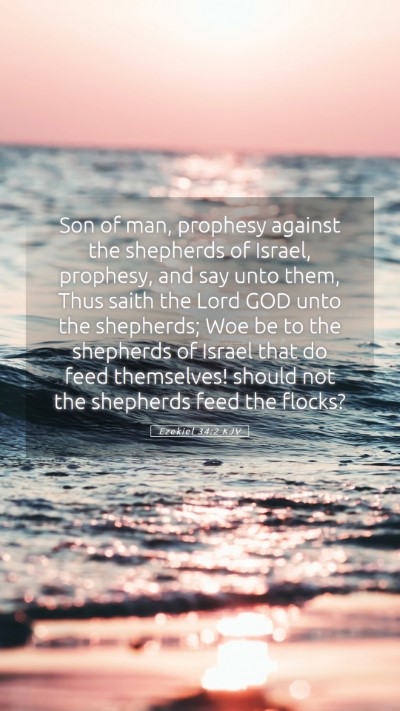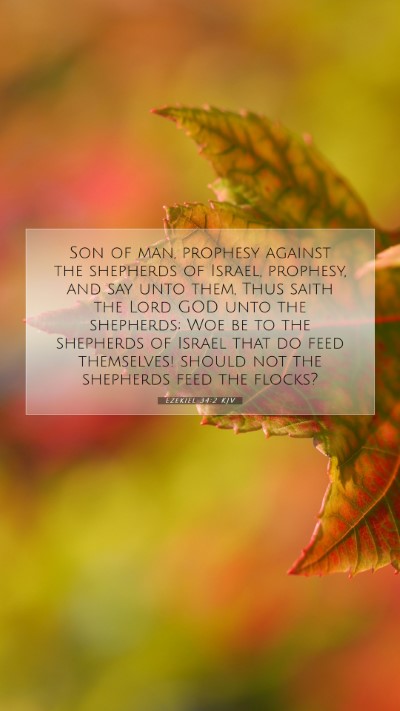Ezekiel 34:2 - Understanding Scripture
Bible Verse: Ezekiel 34:2 - "Son of man, prophesy against the shepherds of Israel, prophesy, and say unto them, Thus saith the Lord GOD unto the shepherds; Woe be to the shepherds of Israel that do feed themselves! should not the shepherds feed the flocks?"
Background and Context
The book of Ezekiel is a prophetic work that addresses the people of Israel during their Babylonian exile, focusing on their past failures and future restoration. This particular verse is part of a larger narrative where God expresses His displeasure with the leaders (or shepherds) of Israel, who have neglected their responsibilities to guide and care for the people.
Commentary Insights
Matthew Henry’s Commentary
Matthew Henry highlights that the "shepherds" represent the leaders and spiritual guides of Israel, who were supposed to watch over the people. Instead, they exploited their positions for personal gain. Henry emphasizes that God’s judgment is directed towards these leaders who have failed in their divine calling to nurture the people entrusted to them. He notes the tragic irony of shepherds looking after their own needs rather than those of their flocks, which signifies spiritual neglect and failure to fulfill God's mandates.
Albert Barnes’ Notes on the Bible
Albert Barnes elaborates on the metaphor of shepherds in Scripture, explaining how it symbolizes leaders. His insights emphasize that the role of a shepherd is to care for the flock - this includes protecting them, providing for their needs, and guiding them in righteousness. Barnes points out that the leaders’ failure leads to a situation where the flock suffers, leading to the inevitable woe pronounced upon them. The neglect of spiritual care has real consequences, not just for the leaders but for the entirety of the community.
Adam Clarke’s Commentary
Adam Clarke provides a deep exegesis on the historical implications of Ezekiel's words. He connects the role of shepherds to the responsibility that comes with spiritual leadership. Clarke emphasizes that the "woe" pronounced by God is a serious warning. He also stresses that such failures not only bring judgment upon the shepherds but also reflect a deeper problem within the nation of Israel as a whole. Clarke urges readers to consider the ramifications of poor leadership and the call for accountability in spiritual roles.
Key Themes
- Divine Responsibility: Leaders are accountable to God for their actions and the wellbeing of their people.
- Judgment on Leaders: God takes seriously the neglect of duty by spiritual leaders.
- Care for the Flock: Proper care and guidance of the people is paramount for any leader.
- Woe as a Warning: The announcement of "woe" serves as an urgent call to repentance and reconsideration of priorities.
Applications for Today
This verse continues to resonate in contemporary settings, especially within church leadership and community guidance roles. It serves as a vital reminder for all leaders — whether in a spiritual, community, or organizational context — to prioritize the needs of those they lead over personal gain. The admonition in this scripture is clear: True leadership in faith requires humility, selflessness, and a commitment to the welfare of the congregation.
Related Bible Cross References
- Jeremiah 23:1-4 - God's condemnation of unfaithful shepherds.
- John 10:11-14 - Jesus as the Good Shepherd.
- 1 Peter 5:2-3 - Instructions for shepherds to care for God’s flock.
- Isaiah 56:10-12 - Warnings about watchmen who are negligent.
- Zechariah 10:2-3 - God's anger against the shepherds who lead His people astray.
Conclusion
In summary, Ezekiel 34:2 serves as a profound reminder of the importance of accountability, leadership integrity, and the consequences of neglect. Through this verse, we gain insights into the essential concepts of biblical leadership and the expectation of care that shepherds — spiritual or otherwise — must hold as they guide others. Understanding this scripture not only deepens our knowledge of the biblical text but also encourages application in our own lives as we navigate leadership roles.


